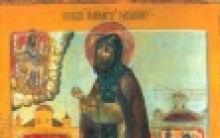The theme of the Great Patriotic War is one of the leading ones in Russian literature of the second half of the twentieth century. Such a great writer as M. A. Sholokhov paid special attention to her. I propose to speculate on the meaning of the title of his story “The Fate of Man.”
What is fate? I think everyone has met those who believe in it and consider life to be predetermined, and those who do not believe in fate. But in any case, a person’s life is always equally filled with happiness and troubles, white stripes give way to black, like day follows night...
So Andrei Sokolov tells his listener about the difficult life path that he had to go through.
Once upon a time, the main character lived happily: he had a desired and beloved mistress-wife, a son and two daughters. He worked hard and was not angry with fate. But his whole life (as well as the lives of other ordinary people) was turned upside down in an instant by one terrible word - war. Then he goes to the front, diligently serves, but is soon captured. All the sorrows that befell him could have “broken” any ordinary soldier, but not Sokolov. He accepted the blows of fate with dignity, in a Christian manner, as befits a Russian man with a capital R.
The episode of the fight with Muller is indicative. Having learned that Andrei was being summoned to the German authorities, the hero not only did not chicken out, but also went to his death with pride, not allowing the enemy to see the fear in his eyes. And how steadfastly he stood in front of the table, bursting with treats, when he himself had already forgotten about human food! All this shows the best qualities of a soldier and a person: courage, courage and fortitude.
Faith played an important role in his courage: faith in the best, anticipation of meeting his family (in his dream Andrei spoke to his family). But the next blow for him was the news of the death of his wife and daughters. Having suffered the loss heavily, the hero now lives only with the hope of a peaceful life with his son, but he also had to bury Anatoly.
Exhausted and beaten by a fickle, evil fate, Andrei Sokolov lost interest in life. Only a little boy, who had to endure no less sorrows, was able to revive the soldier: having met Vanyusha, the narrator realized that in order to build a happy future they simply needed to stick together. “Two orphaned people,” father and son, set off on a long journey along the road of life.
Bottom line: the work shows not just the life of an individual soldier Andrei Sokolov, but the fate of a person in general, who embodied all the main national typical traits. The trials that the hero endured are trials that befell the whole generation that went through the Great Patriotic War. Hence the generalization in the title of the story: a “man”, and not just a “soldier”, survived all this.
A title in a work of art is one of the ways to express the author’s position. It either reflects the essence of the conflicting works, or names the key episode or main character, or expresses the main idea of the work.
Many years after the Great Patriotic War, in 1957, M. A. Sholokhov wrote the story “The Fate of a Man,” based on the life story of an ordinary person, Andrei Sokolov.
The story is narrated in the first person, on behalf of the main character, who talks about his life to a stranger whom he mistook for a driver. Having carefully examined Andrei Sokolov, the narrator pays special attention to the man’s eyes: “eyes, as if sprinkled with ashes, filled with such an inescapable mortal melancholy that it is difficult to look into them.” This detail speaks of the difficult, very difficult life of Andrei Sokolov, because the eyes are the mirror of the soul. The hero tells about his fate. It is this word that M. A. Sholokhov put in the title of the story. Not fate, not fate, not predestination, but precisely fate: a word that contains all previous meanings, but at the same time, here for the writer it is a synonym for the word life. Indeed, the life of Andrei Sokolov at first “was ordinary”: family, wife, three children, a good job, but the war began, which brought pain and suffering. First captivity, then the death of his wife and daughters, and finally the death of his son. Any person who experienced this could become angry, bitter, and curse his fate. But Andrei Sokolov found the strength to help the little boy Vanyusha, who was left an orphan after the war: the hero adopted Vanyusha: “A burning tear began to boil inside me, and I immediately decided: “We must not be lost apart!” I’ll take him as my child.”
Andrei Sokolov himself decided to take in an orphan boy, thereby changing his destiny and filling his life with meaning.
M.A. Sholokhov called the work “The Fate of a Man,” without indicating that the story would be about the life of a specific person who lost the most precious thing in the war: his wife, children, but who retained the most important thing - the human heart. Thus, from a story about the fate of a specific person, the work turns into a story about the fate of all humanity, when everyone is responsible to themselves and others for their lives.
The title of Sholokhov's story is ambiguous: it indicates the moral essence of Andrei Sokolov: from an ordinary driver who married Irinka, had three children, survived captivity, when “death passed by... only a chill came from it...” he becomes the man who adopted Vanya, and Now Sokolov is afraid for his life (my heart is shaking, the piston needs to be changed..."), since now he is responsible for the little boy.
The dream of a soul mate united two orphan destinies: a soldier who went through the war and an orphaned boy, and from now on, united, they walk through life together.
Thus, the title of Sholokhov’s story “The Fate of Man” raises the narrative to the level of universal generalization, making the small story a deep epic that reveals the most complex issues, touching on the foundations of human coexistence.
Essay on literature on the topic: The meaning of the title of Sholokhov’s story “The Fate of a Man”
Other writings:
- A special work that raised the problem of personality psychology during the war to a new height is the famous story by M. A. Sholokhov “The Fate of a Man.” The reader is presented not just with the life story of a soldier, but with the fate of a man who embodied the typical features of the national Russian character. Modest Read More ......
- The word fate has several lexical meanings. The dictionary of S.I. Ozhegov says that this is: A confluence of circumstances independent of each other; Share, fate; The history of the existence of something; The future is what will happen. In the title of Sholokhov's story, the word fate is used in several meanings. Its Read More......
- The story “The Fate of a Man” by Mikhail Aleksandrovich Sholokhov was written in the mid-fifties of the twentieth century. This was a time of revision of the ideological guidelines of the Stalin era, when some relaxations arose in the strict restrictions of censorship. In particular, it became possible to talk in print about people who Read More......
- The structure of “The Fate of Man,” according to B. Larin, goes back to the “Russian version of the short story genre.” “Monumental story” is how modern researchers define the genre of “The Fate of Man.” The writer turned to the form of a “story within a story.” The narrative is framed by the author's beginning and a short ending. The author's beginning is Read More ......
- The story was written in 1956 during Khrushchev’s “thaw”. Sholokhov was a participant in the Great Patriotic War. There he heard the life story of one soldier. She really touched him. Sholokhov harbored the idea of writing this story for a long time. And so in 1956 Read More......
- M. Sholokhov wrote the story “The Fate of Man” in an amazingly short time - in just a few days. On the eve of the new year, 1957, the story “The Fate of Man” was published in Pravda, which amazed the world with its artistic power. The story is based on a real fact. In Read More......
- Sholokhov's story “The Fate of Man” was published in 1956-1957, ten years after the end of the Great Patriotic War. The theme of the story is unusual for the literature of that time about the war: it was Sholokhov who first touched upon the topic of soldiers captured by fascists. As is now well known, Read More......
- M. Sholokhov's story “The Fate of a Man” was written in 1956. This work is based on real events. In 1946, the author met an unknown person who told the story of his life. It was this life situation that became the plot basis of the work. Theme of the story Read More......
M. Sholokhov's story “The Fate of a Man” is one of the most famous works of Russian literature. It tells the story of the life of a single person, Andrei Sokolov, whose fate was befallen by the most terrible epoch-making events: revolution, war, which crippled a person’s life, which, in my opinion, suggested the title of the story to the author.
Only the fate of a truly worthy person could be described in the work. The difficult life of Sokolov, who managed to go through severe trials, preserving his humanity and kindness, faith and hope, perseverance and personal dignity, love for life and people, was suitable for this.
Three times Sokolov, a native of the Voronezh province, experiences losses. And what! In the hungry year of '22, he loses his parents, but finds the strength to live, work, love. Andrey meets his only one, Irinka. He knows happiness at that time: his home, his beloved children. Happiness that will be destroyed by war.
From the first days of the Great Patriotic War, Sokolov was at the front. He fights heroically, but is captured. But even in captivity he remains a Man and does not lose his dignity and pride as a Russian soldier. There is so much nobility in his words: “... they did not turn me into a beast, no matter how hard they tried.” And how Andrei experiences his meeting with his native land after a successful escape from German captivity. So he remembers: “...fell to the ground and kissed it, and I couldn’t breathe...”. Freedom! Your people are around! And suddenly a terrible blow of fate: a bomb hit his house in Voronezh. My wife and daughter died. It was as if Andrei’s heart had hardened, and only faith in his son Anatoly and life together with him gave the soldier strength.
The last days of the war... Victory! What a joy! And Sokolov is in grief: the damned fascists will kill him on the days of his heroic son’s triumph. Here it is, fate!
But the Soviet man does not give up: not everything has yet turned to stone in his heart! He decides to adopt a boy, a child of war. “Two orphaned people, two grains of sand, thrown into foreign lands by a military hurricane of unprecedented force” find each other by the irony of evil fate and become the closest people.
Thus, M.A. Sholokhov, forming new views and depicting in all authenticity the fate of an individual person of the era, depicts the fate of the entire country. Having unfortunately lost close people and the opportunity to be happy, the Russian people did not lose the most important thing, human dignity and desire to live. I think that’s why M.A. Sholokhov’s story is called that.
M. Sholokhov -
one of those writers who himself walked the roads of war.
story “The Fate of Man” by Sholokhov
he wrote with concern and sympathy about the fate of those who were captured. Such in
the country had 6 million
Human. Not everyone gave up, of course -
there were other circumstances: injury, concussion... However, everyone, without exception, was expected to go to camp later
was first published in the newspaper Pravda
In the story “The Fate of Man,” a Russian man is drawn with great love,
persistent, courageous, able to take responsibility.
Compositional
A special feature of the story “The Fate of a Man” is the presence of an author - a narrator.
Talking about
of his pre-war life, the hero resurrected the images of people dear to him: his wife Irina,
two daughters and a son. Ten years of family life flew by like one day.
From the very beginning of the war, Sokolov found himself in the ranks
Red Army, on the front line. No matter how bravely the Russian soldiers fought, still
at the beginning of the war it was necessary to retreat. wounded
Andrei Sokolov is captured.
Sholokhov is honest, devoted, passionately loving his homeland. The Nazis couldn't
break his will, failed to change his consciousness, did not persuade him to
betrayal. In fellow sufferers
he always found moral and physical support. If about your stay in
in captivity, the hero speaks, as if apologizing to someone, a story about a military
a doctor who was captured but helped the wounded is colored by intonation
admiration: “This is what a real doctor means! He is in captivity, and in the darkness his
did a great job."
The first attempt to escape from captivity ended
failure. Andrei Sokolov, mutilated by dogs and beaten by the Nazis, is imprisoned
punishment cell “It’s hard for me, brother, to remember all the comrades who died
tortured there in the camp - the heart is no longer in the chest, but in the throat, and
It's getting hard to breathe..."
Certificate
the greatness of the Russian soul is
psychological duel between Andrei Sokolov and the head of the Muller camp.
Sokolov rejected the offer to “drink German weapons to the victory,” but agreed
drink to my death: “I wanted to show them, damned ones, that I also have
has its own Russian dignity and pride...”
And yet the hero accomplished
cherished dream, managed to escape from captivity and move to his own in the active
writers accused Sholokhov of falsehood. But it is thanks to such brave heroes,
as the hero of the story “The Fate of Man”,
victory was won in this terrible war.
liberation was overshadowed by the most terrible news “... back in June forty-two
died during the German bombing
his wife and daughters. IN
On Victory Day, his eldest son dies in Berlin. Everything that was dear to the hero
taken away by the war.
The character of Russian people breaks under the blows of fate. Like some kind of light
strength gave him a meeting with an orphan boy. “Such a little ragamuffin...
eyes like stars at night, after
rain! He finds the meaning of life in giving an orphaned boy a family.”
I leaned towards him and quietly asked, “Vanyush, do you know who I am?” He
asked as he sighed: “Who?” I told him
I say just as quietly: “I am your father.” My God, what happened here: he threw himself on my neck,
kisses on the cheeks, lips, forehead. How about you
waxwing, so loud and thin
shouts: “Folder, dear! I knew! I knew,
that you will find me! You'll find it anyway.
I’ve been waiting so long for you to find me!”
The man is not
maybe you shouldn’t be alone in the world, life should have meaning, you can fight with hatred, but live only with
spiritual beauty of a random interlocutor: “And I would like to think that this Russian
a man, a man of unbending will,
will survive, and near his father's shoulder will grow one who, having matured, will be able
endure everything, overcome everything on your way, if the Motherland calls for it.” M. Sholokhov
once again confirms that love for the Motherland, for one’s land shapes the inner
human world. Fate
a person is the fate of the country, and the problems that are raised in this story are relevant and
echo the problems of today: this is the problem of “man and war”,
readiness for self-sacrifice, faith in the future. It was the Russian soldier who brought
Victory for the whole world. And it is very sad that the rulers of some countries are trying
rewrite the results of history: monuments, entire memorial complexes are demolished,
dedicated to Soviet soldiers. The story "The Fate of Man" is a reminder of
about who and at what cost peace on the planet was won. This holy book is necessary
re-read for the children, for you and me, and
rulers of states. Now, as
our country never needs love, the unification of its fellow citizens, knowledge
A title in a work of art is one of the ways to express the author’s position. It either reflects the essence of the conflicting works, or names the key episode or main character, or expresses the main idea of the work.
Many years after the Great Patriotic War in 1957, M.A. Sholokhov writes the story “The Fate of a Man”, the plot of which is based on the life story of an ordinary person Andrei Sokolov.
The story is narrated in the first person, on behalf of the main character, who talks about his life to a stranger whom he mistook for a driver. Having carefully examined Andrei Sokolov, the narrator pays special attention to the man’s eyes: “eyes, as if sprinkled with ashes, filled with such an inescapable mortal melancholy that it is difficult to look into them.” This detail speaks of the difficult, very difficult life of Andrei Sokolov, because the eyes are the mirror of the soul. The hero tells about his fate. This is exactly the word given to M.A. Sholokhov in the title of the story. Not fate, not fate, not predestination, but precisely fate: a word that contains all previous meanings, but at the same time, here for the writer it is a synonym for the word life. Indeed, the life of Andrei Sokolov at first “was ordinary”: family, wife, three children, a good job, but the war began, which brought pain and suffering. First captivity, then the death of his wife and daughters, and finally the death of his son. Any person who experienced this could become angry, bitter, and curse his fate. But Andrei Sokolov found the strength to help the little boy Vanyusha, who was left an orphan after the war: the hero adopted Vanyusha: “A burning tear began to boil inside me, and I immediately decided: “We must not disappear separately!” I’ll take him as my child.”
Andrei Sokolov himself decided to take in an orphan boy, thereby changing his destiny and filling his life with meaning.
M.A. Sholokhov called the work “The Fate of a Man,” without indicating that the story would be about the life of a specific person who lost the most precious thing in the war: his wife, children, but who retained the most important thing - the human heart. Thus, from a story about the fate of a specific person, the work turns into a story about the fate of all humanity, when everyone is responsible to themselves and others for their lives.
The title of Sholokhov's story is ambiguous: it indicates the moral essence of Andrei Sokolov: from an ordinary driver who married Irinka, had three children, survived captivity, when “death passed by... only a chill came from it...” he becomes the man who adopted Vanya, and Now Sokolov is afraid for his life (my heart is swaying, the piston needs to be changed ...), since now he is responsible for the little boy.
The dream of a soul mate united two orphan destinies: a soldier who went through the war and an orphaned boy, and from now on, united, they walk through life together.
Thus, the title of Sholokhov’s story “The Fate of Man” raises the narrative to the level of universal generalization, making the small story a deep epic that reveals the most complex issues and touches on the foundations of human coexistence.











Formation of universal educational actions in speech therapy classes at educational institutions in the context of the introduction of federal state educational standards
A collection of games and exercises for the development of coherent speech in children of middle preschool age “We play together - we develop speech Techniques for developing coherent speech
Provisions of the job description of the chief engineer of the project What does a hydraulic engineer do?
Chief Project Engineer (GPI) Responsibilities of the chief engineer in the GOST design organization
Conventional graphic symbols